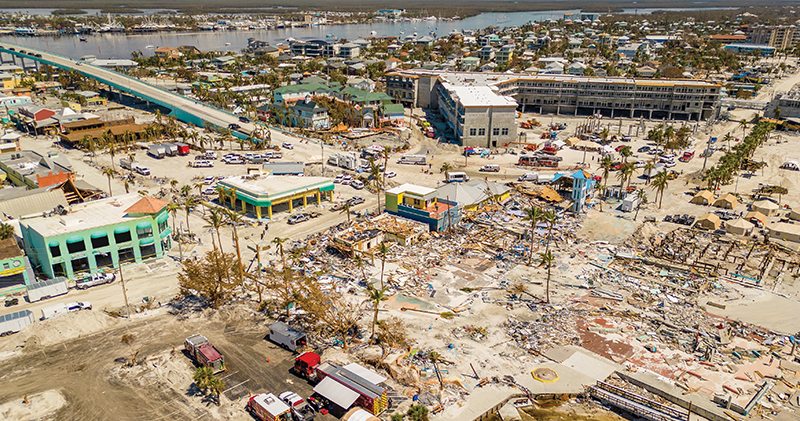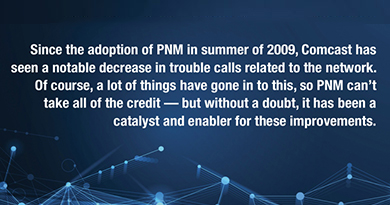Cross Sector Resilience Forum
By Andy Scott
Over the past several years, the intensity and frequency of hurricanes, wildfires, and other emergency and disaster events have increased awareness of the cross-sector interdependencies that are foundational to timely and safe restoration of critical services. At the same time, around the world the importance of connectivity and access to information has increased. New dependencies on connectivity are emerging every day and include telehealth, online education and expanded business operations. We are an interconnected world, and the cable broadband industry is right in the middle of that important resource we depend on.
SCTE as the ANSI accredited standards body for the cable broadband industry has a dedicated working group that brings the subject matter experts together to share timely information, common operational practices and develop necessary standards helping to deepen our industry resilience and readiness to respond to incidents. Standards enable easier interoperability and faster response times to threats. The team has released several of such resources, which can be downloaded for free at the SCTE website under the standards menu.
In addition to developing these important documents, the team is the gateway for getting involved with the United States Department of Homeland Security SHARES Program. SHARES or SHAred RESources is a government run program that offers a way to communicate via high frequency radio during and after incidents when all other traditional forms of communication are no longer available. This infrastructure-independent form of communication does not require a FCC license but does require an NDA to get access to the confidential frequencies. In addition to voice, email can also be sent and received with the proper hardware in the event local Internet or email infrastructure is compromised. All of the major United States sectors are involved in SHARES and this service is a great way to help the cable broadband industry get vital timely information to reduce obstacles to restoration.
Speaking of cross sector interdependencies, the communications (including wireless, wireline and cable) and electric sectors are essential to all sectors’ response efforts during widespread emergency and disaster events. With greater collaboration, the communications and electric sectors can help to ensure that services are maintained and speed the restoration of services for first responders, consumers, and businesses. For these reasons, CTIA, Edison Electric Institute (EEI), NCTA – The Internet & Television Association and USTelecom – The Broadband Association created the Cross-Sector Resiliency Forum (Forum) in the spring of 2020.
The Forum convenes communications providers and electricity providers to identify and implement strategies for improving information sharing and enhancing coordination between these industries before, during, and in the immediate aftermath of emergencies and disasters. While individual communications and electricity providers routinely collaborate at the local level, both with and without government officials, the Forum provides an opportunity for communications and electricity providers and their associations to discuss resiliency and response efforts related to emergency and disaster events across companies, sectors, and geographies, without the scrutiny of government officials.
Since its inception, the Forum’s membership has rapidly grown to reflect broader representation from the communications and electric sectors, and the collaboration between the two sectors has achieved a number of outcomes to improve timely and safe restoration of critical services, including:
- Cross-sector local contact information – Cross-sector communication before, during, and after an emergency is key to a safe and efficient restoration. Knowing in advance local contacts for communication and coordination is critical. To meet this objective, the Forum maintains a list of local cross-sector emergency contacts for participating members to use in the event standard communication methods are not functioning.
- Exercises and Workshops – The Forum facilitates the sharing of upcoming industry exercises and workshops and maintains a list of these events to inform participating members about opportunities for education and collaboration. Having cross-sector participation in exercises and workshops helps companies better prepare for and improve real world restoration efforts.
- Exercises – Tabletop and functional exercises help improve communication and coordination across the sectors. Local and state agencies routinely use these events to test their processes, as do communication and electricity providers. Where feasible, companies from both sectors are encouraged to invite members of the other sector to observe or participate in their exercises.
- Workshops – Both the communications and electric sectors participate in workshops to share best practices and agree on initiatives with the goal of improving their emergency preparedness processes to respond to a disaster. Here again, providers are encouraged to share information about workshops across the sectors and look for opportunities to include other sectors in relevant portions of workshops.
- Documenting successful practices – The Forum has created working groups to improve mutual understanding of each sector’s best practices and procedures to plan for and respond to emergency and disaster events that threaten service continuity. To date, these groups have developed recommendations on practices which have proven successful at facilitating coordination among communications and electric companies, as well as among these sectors and local, state and national government entities. Additional topics currently under consideration by these working groups include road clearing coordination and wires down communications.
In addition to the working group activities, the Forum also convenes two meetings of the full membership each year – one in the spring (before hurricane and wildfire season) and one in the fall (after hurricane and wildfire season). The purpose of these meetings is for operational and regulatory personnel from participating companies and associations to recap recent experiences and identify objectives for the upcoming period. For example, at the Forum’s Fall 2022 meeting, over 40 member companies convened to look back at the preparations and response to the most recent disaster events (Hurricane Ian, in particular). In addition to “what worked,” several opportunities to enhance our coordination and collaborative efforts in future disaster events were also identified.
Now in its third year, the Forum continues to provide the nation’s leading communications providers and electric companies, and their major trade associations, an effective venue for collaboration on resiliency. In the face of increasingly significant emergency and disaster events, the communications and electric sectors are working together in the Forum to enhance coordination and cooperation to improve resiliency and ensure these critical services are available when Americans need them the most.
 Andy Scott
Andy Scott
Vice President, Engineering at NCTA –
The Internet & Television Association
Andy Scott, Vice President, Engineering at NCTA – The Internet & Television Association, has been an active member of the SCTE standards program since 1987 and was the “Excellence in Standards Award” recipient in 2022. His contributions include membership in the Data Standards Subcommittee, Digital Video Subcommittee, Energy Management Subcommittee and others over his nearly 36 years as a member of SCTE. Andy is also a member of the SCTE Business Continuity Planning/Disaster Recovery working group as well as NCTA’s representative on the FCC’s Cross Sector Resiliency Forum that works on related activities with other communications providers. At NCTA, Andy has been a major contributor to and heavily involved in all aspects of technical issues arising with cable regulation and legislation. He has worked on video, broadband and spectrum issues, including countless technical meetings with the FCC over the years. He also represents the industry on various government agency working groups.
Fort Myers Beach destruction in the aftermath of Hurricane Ian.
Image: Shutterstock — Felix Mizioznikov



